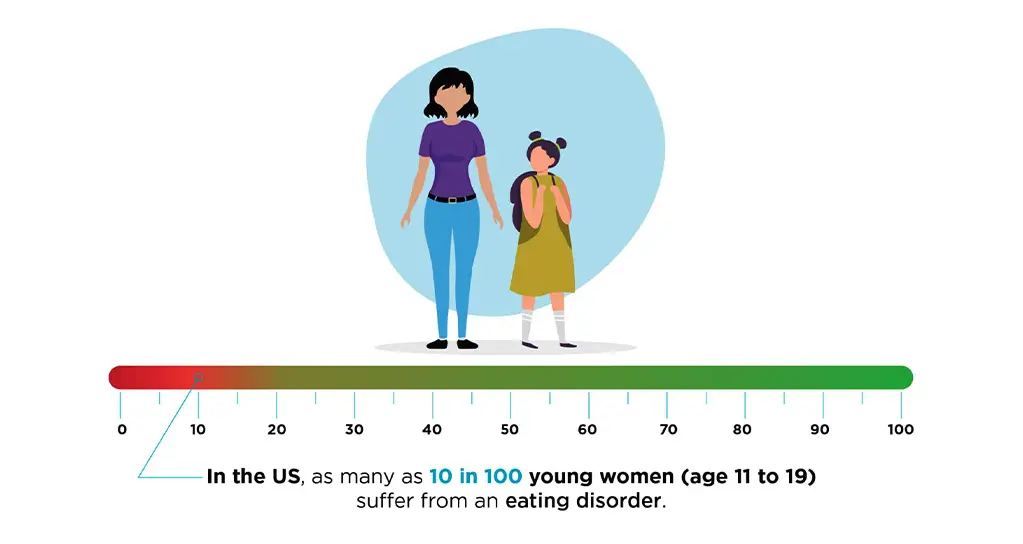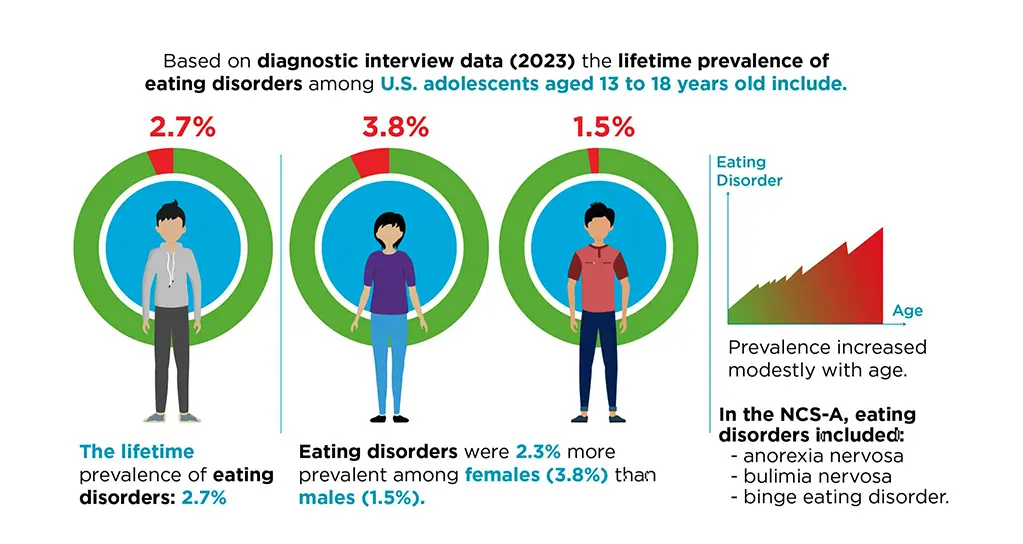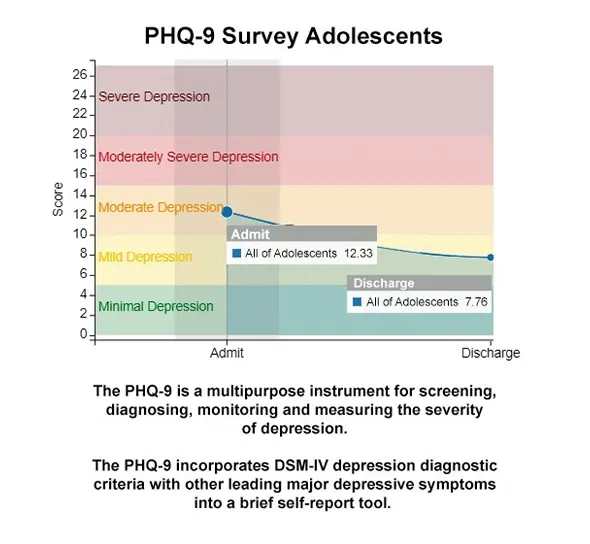Treatment for Teenage Eating Disorders
Adolescents are constantly undergoing changes to their physical appearance, and may struggle to feel comfortable in their bodies or feel pressured to look a certain way by classmates, school, the media, and the internet. As a result, eating disorders in teens can easily go undetected by adults, depending on the severity of the disorder. Determining whether or not your child has an eating disorder, and how to address it, is not an easy task for parents and loved ones. SunCloud Health is here to help you through these difficult times. Please contact us to speak with a mental health professional and determine if our eating disorder recovery offerings are the right fit for the needs of your child, patient, or student.
What Are Teen Eating Disorders?
Oftentimes, teenagers hide serious and sometimes fatal eating disorders from their families and friends. The most common eating disorders include anorexia nervosa, bulimia nervosa, and Binge Eating Disorder (BED), with symptoms being characterized by a preoccupation with food or body weight and a distortion of body image. Other eating disorder conditions include Avoidant Restrictive Food Intake Disorder (ARFID) and Other Specified Feeding or Eating Disorder (OSFED).
Anorexia nervosa and bulimia are on the increase among teenage girls and young women, as well as boys though not as commonly, and often run in families. These disorders can have serious physical and mental health effects and consequences for youth struggling with them.

Underlying Causes of Teen Eating Disorders
There’s no single cause for adolescent eating disorders. Genes, environment, health problems, and stressful events all play a role. However, some factors can increase a person’s chance of having an eating disorder, such as:
- Too much focus on weight or looks
- Dieting at a young age
- Playing sports that focus on weight (gymnastics, ballet, ice skating, and wrestling)
- Having a family member with an eating disorder
- Mental health problems such as anxiety, depression, or OCD
- Poor body image

Video: HOW SHOULD A PARENT BROACH THE TOPIC OF TEEN EATING DISORDERS?
Approaching a loved one about a potential eating disorder, disordered eating patterns, and when to seek treatment is a sensitive subject. Dr. Kim Dennis, MD, CEDS, gives advice on the importance and tips to broach the subject when considering teen eating disorder treatment.
Statistics about Teenage Eating Disorders
According to diagnostic interview data from National Comorbidity Survey Adolescent Supplement (NCS-A), the lifetime prevalence of eating disorders among U.S. adolescents aged 13 to 18 years was 2.7%. Common eating disorders included anorexia nervosa, bulimia nervosa, and binge eating disorder, and were more than twice as prevalent among females (3.8%) than males (1.5%). This prevalence increased modestly with age.

National Statistics for Children and Adolescents Experiencing Disordered Eating:
- A 2011 nation-wide study approximated that half a million U.S. teens between 13-18 have some form of an eating disorder
- Binge-eating disorder (BED) is the most common, affecting more than 1.5 percent of kids studied
- BED often leads to obesity
- 50% of girls between the ages of 11 and 13 see themselves as overweight
- 80% of 13-year-olds have attempted to lose weight
- 40% of newly identified cases of anorexia are in girls 15-19 years old
- Anorexia is the 3rd most common chronic illness among adolescents
- 95% of individuals with an eating disorder are between the ages of 12 and 25
Eating Disorder Symptoms & Treatment Options
Binge Eating Disorders Although adolescents are less likely than adults to meet BED criteria, related behaviors such as loss–of–control eating are prevalent. Symptoms include:
- Eating large amounts of food in a specific amount of time, such as a 2-hour period
- Eating even when full or not hungry
- Eating fast during binge episodes
- Eating until you’re uncomfortably full
- Eating alone or in secret to avoid embarrassment
Other symptoms may include frequently dieting, possibly without weight loss, and feeling distressed, ashamed, or guilty about eating. A comprehensive treatment program involves Cognitive Behavioral Therapy (CBT), Cognitive Processing Therapy (CPT), and Interpersonal Psychotherapy (IPT).
- Purging (self-induced vomiting)
- Using laxatives or enemas to speed up the movement of food through your body
- Frequently doing intensive and excessive exercise
- Regularly fasting or dieting despite weight loss
- Individual therapy
- Family therapy
- Behavior changes
- Nutritional rehabilitation
- Medicine for depression or anxiety, if applicable
Anorexia Nervosa in TeensIt’s important to know the signs and symptoms of anorexia nervosa in adolescents in order to ensure prompt treatment. Common indications include:
- Eating very little, to the point of starving
Intensive exercise - Extreme weight loss or thinness
- Intense fear of gaining weight
- Distorted body image – seeing oneself as overweight despite being severely underweight
Various treatment avenues are available for adolescent anorexia, such as Family-Based Treatment (FBT) and Cognitive Behavioral Therapy (CBT), as well as individually based approaches that are psycho-dynamically informed and developmentally tailored.

Treatment for Eating Disorder Recovery: What Are Your Options?
Eating disorders can be treated successfully. Early detection and treatment are important for a full recovery, as adolescents with an eating disorder are at higher risk for suicide and medical complications, such as high blood pressure and effects of poor nutrition. Family therefore plays a crucial role in treatment. Family members can encourage the adolescent with eating or body appearance issues to seek help, as well as provide support during treatment and be a great ally to both the individual and the health care provider.
Adolescent eating disorder treatment plans may include psychotherapy (“talk therapy”), medical care and monitoring, nutrition education and counseling, medications, or a combination of these evidence based treatment approaches. Typical goals include:
- Restoring adequate nutrition
- Bringing weight to a healthy level
- Identifying unhealthy eating patterns
- Reducing extreme exercise
- Stopping binge purge and-binge-eating behaviors
People with eating disorders also may have other mental health conditions (such as depression or anxiety) or problems with substance abuse. It’s critical to treat any co-occurring disorders as part of the treatment plan. At SunCloud Health, we don’t turn a blind eye to the co-occurring as we understand all things go together. We don’t work on just one thing, instead creating treatment plans that focus on all aspects of the person’s mental health in order to be fully treated. This approach offers a unique niche in the community that many other treatment facilities don’t fill but is vital to ensuring each patient receives a holistic, well-rounded experience while in our care to treat eating disorders.
Video: WHAT QUESTIONS PARENTS SHOULD ASK A TREATMENT PROVIDER?
Dr. Alexander Chevalier, Medical Director of Child and Adolescent Psychiatry at SunCloud Health, details the questions parents should be asking when looking for an eating disorder care provider.
Video: WHAT TO LOOK FOR IN TREATMENT FOR YOUR CHILD?
Dr. Alexander Chevalier, Medical Director, Child and Adolescent Psychiatry at SunCloud Health, gives parents helpful advice on what to look for when considering eating disorder treatment centers for their child.
Treatment of Eating Disorders in Adolescents at Suncloud Health
SunCloud Health offers customized teen eating disorder treatment programs. Our goal is to ensure patients never feel stigmatized, blamed, or shamed when they walk through our doors, but instead find support and community as they receive help for eating disorders and complex-co-occurring issues.
To this end, we carefully consider individual needs and create specific accommodations for treating eating disorders in teens, including Partial Hospitalization Programs (PHP) and Intensive Outpatient Programs (IOP). All programs are designed for adolescents requiring varying levels of support, with dedicated time for schoolwork and direct collaboration with their schools.
Our treatment program is successful in addressing eating disorders in teens because we understand that true long-lasting and sustainable recovery is about more than just restoring weight or helping someone stop purging. Adolescents work together in process groups and skills-based therapies, such as Acceptance and Commitment Therapy (ACT), Dialectical Behavioral Therapy (DBT), and 12 Steps, to discuss the challenges they face with disordered eating, what’s going on in their lives, and their recovery journey while building coping skills for the issues they face now and in the future. Treatments also include the opportunity for family members to be involved in the process through family education, support, and therapy sessions.
Our objective is to target the source of the pain with love and compassion, using the experience of our trained experts, many of whom are in recovery themselves. Adolescents spend time not only with their groups, where they are encouraged to build a community of support with one another outside of treatment, but also with their individual treatment plan coordinators, such as our psychiatrists and registered dietitians.
Our PHP runs Monday through Friday from 9am-3:30pm, while our IOP is available three to five times weekly from 4-7pm. Programs are available at our Naperville, Chicago, and Northbrook centers.
Video: Does It Make Sense to Pull My Kid Out of School for Treatment?
Hear from Dr. Chevalier on the balance school and extracurricular activities with treatment. In most cases, coursework is unaffected and can be improved while a student is out of school receiving treatment for eating disorder recovery.
From admit to discharge, we see an aggregate improvement in our adolescents as measured by the PHQ-9. Lower scores reflect an improvement.

